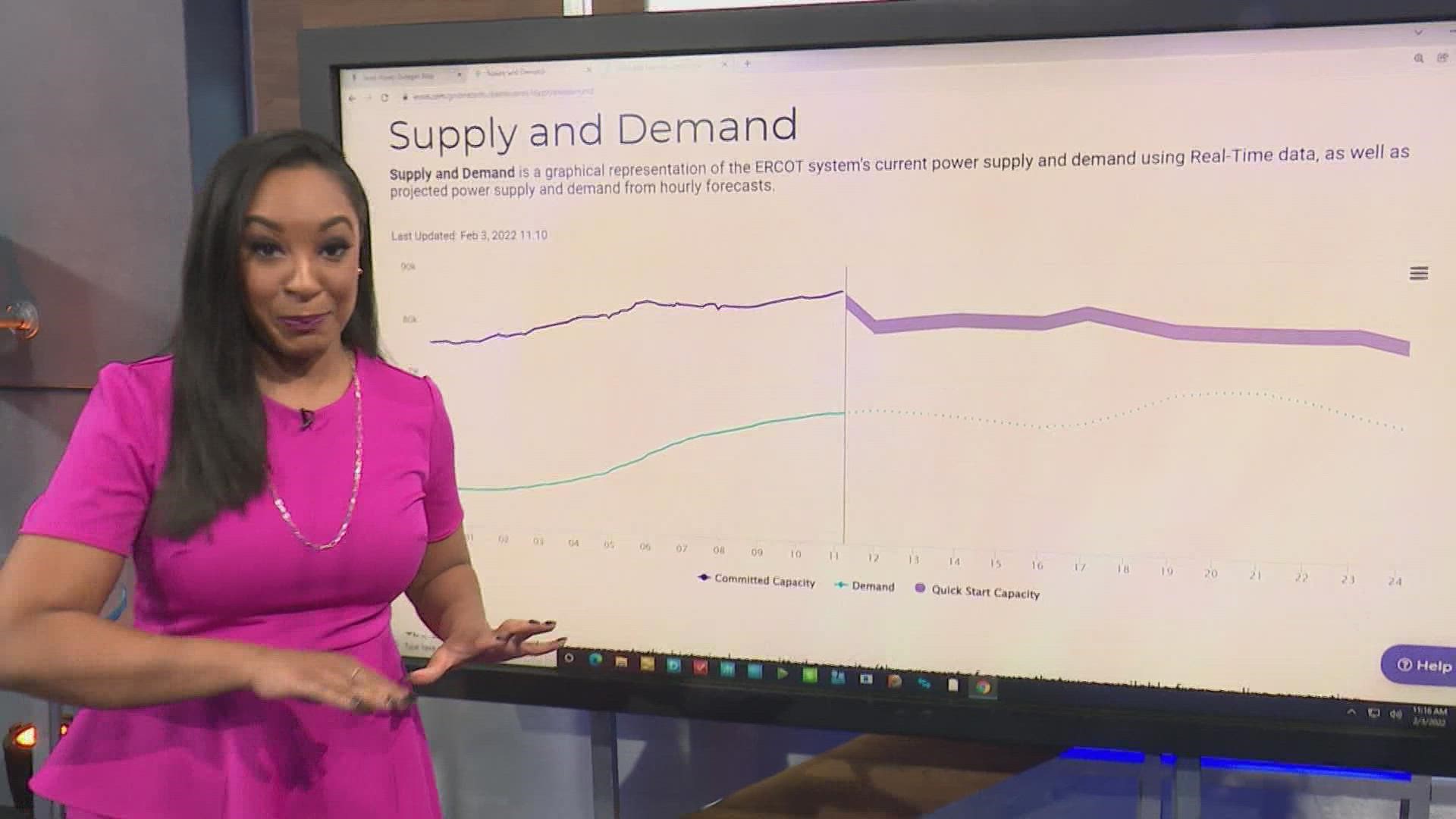DALLAS — The Electric Reliability Council of Texas (ERCOT) is projecting an all-time winter peak demand for energy this week -- more than last year's February storm -- but the state power grid also has more energy reserves on hand and is expected to remain online, officials said.
ERCOT's latest forecast on Thursday projected a peak demand of 74,700 megawatts at 8 a.m. Friday.
Last year's peak demand in February was 69,692 megawatts, which pushed the Texas grid to near failure and led to millions of Texans losing power.
The demand this week, if ERCOT's projections hold, would easily surpass last year's winter peak, and also rival the all-time peak demand of 74,820 megawatts that was set in August 2019.
But, this time around, ERCOT officials said the state power grid should have enough energy reserves to handle all the demand.
Gov. Greg Abbott, in a news conference on Thursday said Texas should have about 10,000 megawatts in reserves at peak demand this week.
RELATED: Natural gas providers notify ERCOT of supply reductions: What that means for the power grid
On Thursday, the state had about 20,000 megawatts in reserves -- an "extraordinary supply of extra power," Abbott said.
A single megawatt is enough to power up to 200 homes.
"The power grid is performing very well at this time," Abbott said.
About 70,000 people, including 25,000 in North Texas, were without power on Thursday due to local outages unrelated to the state power grid.
ERCOT CEO Brad Jones said the level of icing in the state has been "significant," but not as severe as expected, allowing wind operators and other generators to remain online.
As of noon on Tuesday, no power generators had gone offline due to cold weather. Jones attributed the state's winterization requirements for power generators with helping keep operators online this week.
In November, ERCOT had projected a peak winter demand of about 62,000 megawatts, "based on the average weather conditions at the time of the winter peak demand."
Todd Staples, president of the Texas Oil & Gas Association, said there have not been any “significant events" during the storm.
He said that Texas, the nation’s largest natural gas producer, remains “very fortunate” because its natural gas supply far exceeds demand.
Staples also added that, even if production diminished, there is ample supply in the marketplace. He said Texas has a massive-by-any-account amount of natural gas in storage – about 125 times the normal daily usage needed for electric power generation.
"We’ve experienced temporary loss of power, high winds and icing conditions" that may get worse, but he said the problems were anticipated, with oil and natural gas providers spending hundreds of millions of dollars to prepare for bad weather.
RELATED: Winter weather updates: Ice and snow cause power outages and traffic issues across North Texas
Still, some are concerned.
"It just requires more energy to heat homes when it's very cold than to cool them when it's hot," said Beth Garza, a senior energy fellow at the R Street Institute. "In the summer. I'm trying to cool my house from 100 degrees outside to 75 to 80 inside, a change of 20 to 5 degrees. Right now in Austin. it is 28 degrees and I'm trying to keep my home at 67 degrees -- a nearly 40 degree increase. As it gets colder outside, the gap will increase and the amount of energy required -- either natural gas or electricity -- will increase."
Garza said it's critical to have proper insulation in the walls, windows and roofs of homes in order to reduce the amount of electricity it takes to heat them.
Doug Lewin, an energy consultant, agreed with Garza's assessment. He added that Texas could also be seeing a form of PTSD among consumers who are preheating their homes or turning their heat up really high because of what happened with last February’s winter storm.
Said Lewin: "Ideally, you’d have a situation where the PUC could tell everybody, 'Hey, we’re all in this together. Keep your home at a safe level but don’t overheat because that puts more strain on the grid.' But they can’t say that because, if they do, then everyone will panic and turn their heater up."

